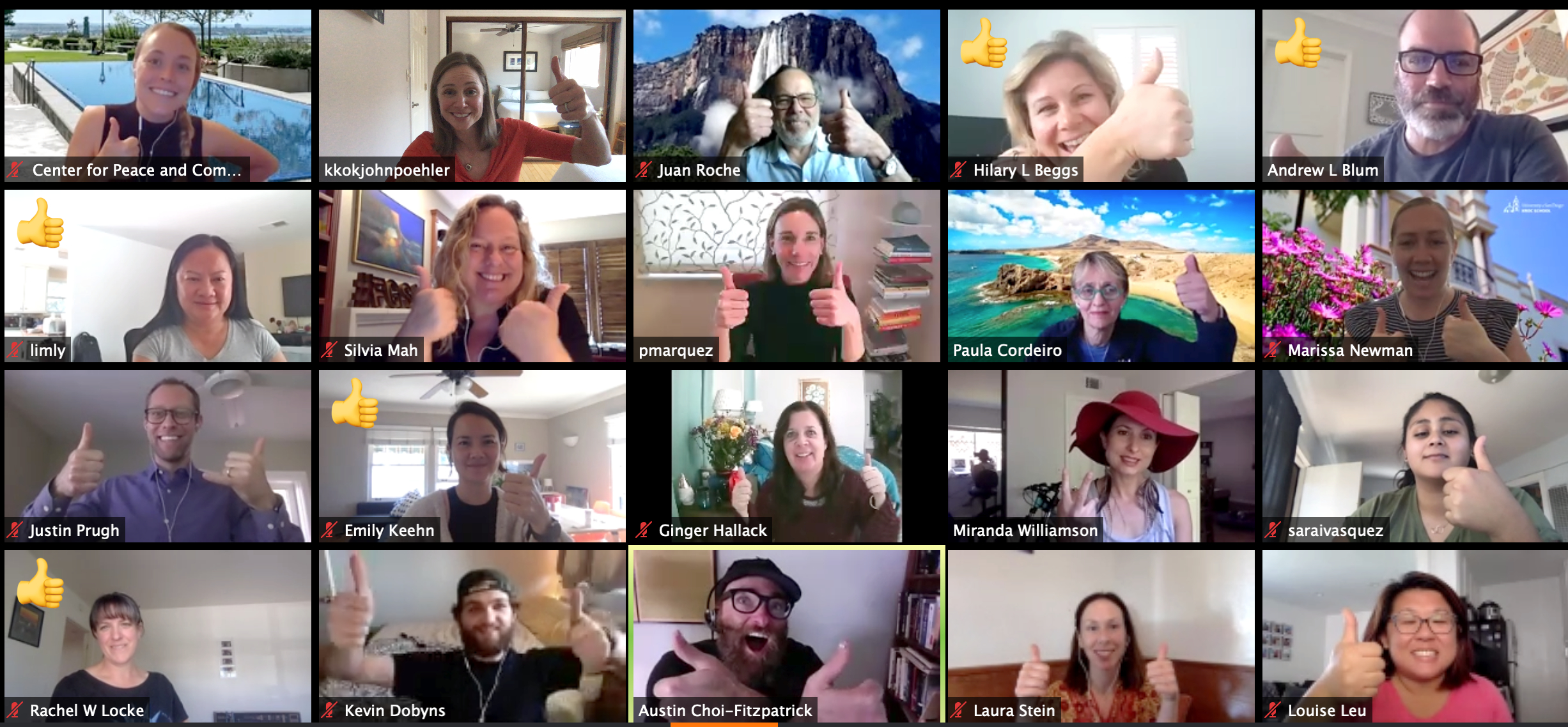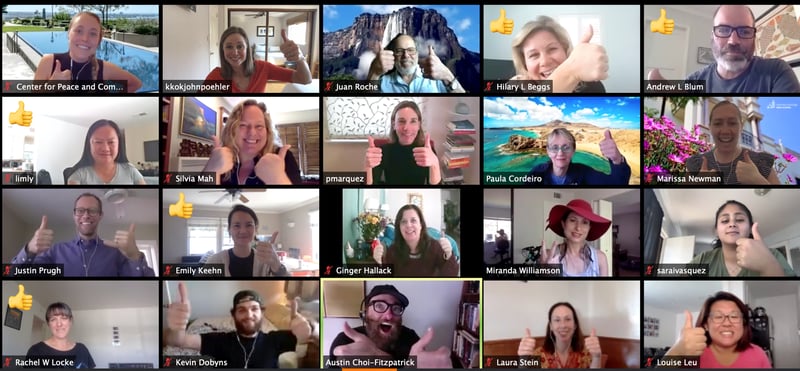Thinking Outside The Classroom: Kroc School Seizes Opportunities Presented by Remote Learning

Thinking Outside The Classroom: Kroc School Seizes Opportunities Presented by Remote Learning

Members of the Kroc School team show their spirit during a recent meeting.
At the University of San Diego’s Joan B. Kroc School of Peace Studies, our faculty and students have shifted to remote learning as a result of the COVID-19 pandemic. Fortunately, thinking outside the classroom has always been a part of our approach to peacebuilding and social innovation. Take a look at how we’re using these unique circumstances and virtual tools to offer experiences inspiring students to choose the Kroc School for a graduate program.
TEACHING
Access to High-Level Peace Negotiators
The global shelter-in-place mandates brought a fortuitous opportunity to students of Professor of Practice Michael Fryer’s International Negotiations Class. Irene Santiago from The Philippines is one of the few women in the world to have been involved in high-level peace negotiations, representing the government's side of implementing key aspects of the peace process with the MILF on Mindanao. At a point in her life when most people are well and truly retired, Irene's drive, energy and determination continue to inspire. She's normally so busy that it's a challenge to get access to her. Professor Fryer, who is close to Santiago, took advantage of a schedule opening afforded by the stay-at-home orders and asked her if she would call in to speak with his class. She was happy to do so. The students noted the opportunity to speak with her as “genuinely the coolest thing I have done in class this semester” and the best example of virtual learning allowing for new opportunities.
Media Interview Simulations: Lights. Camera. Action.
What’s the best way to share your peacebuilding story with media? Professor Dustin Sharp recently led his class through a simulation in which students took on the roles of a TV journalist and nonprofit employee “in the field” in order to hone this important skill. One student played the part of a news anchor, and another practiced responding to their challenging questions, weaving in pre-defined talking points. What typically worked well in the classroom worked even better through remote learning because the experience of connecting through a webcam was undeniably more authentic – a truer representation of how peacebuilders in the field connect with journalists composing their stories.
Conflict Mediation: Designing for a New Reality
In his Mediation course, Professor Phillip Gamaghelyan recently shared two mediation models with his students and then inspired them to design their own with adaptations for current conditions. Students worked in small groups applying theory to what is happening on the ground right now and eventually presented back to the class a multi-day virtual mediation design including a roleplay of one of the core sessions.
Virtual City Tour: Stepping Into Lived Experience
This semester, Dr. Ami Carpenter had originally planned to take her class on an in-person tour of the San Diego neighborhood of Broadway Heights and its celebrated MLK Promenade with Robbie Robinson, a community leader who spearheaded a peacebuilding effort there that reduced gang crime and homicides. Instead, she and Robbie leveraged Zoom to lead students through a virtual experience using Google Earth to navigate geographically, a visual presentation to contextualize history, and videos to share lived experience research. She mixed available modalities to leapfrog beyond a typical virtual tour. Her goal was to reimagine the student experience and how she might broaden their perspectives with her mashup during this temporary reality.
Survey Sampling and Research Design
Professor Topher McDougal focused one of his Program Design, Monitoring & Evaluation class sessions on survey sampling. Their goal was to assign 50 different clusters to all of the districts in the Middle Belt States of Nigeria. Pulling together data from a real cost-of-conflict study carried out by Professor McDougal for the INGO Mercy Corps, teams worked to populate the spreadsheets at rapid pace while also pausing to troubleshoot along the way. Other exercises on survey and research design took place in this virtual hackathon-like environment, allowing for a divide-and-conquer feel. With everyone on their own computers, they were able to work rapidly in small group chat rooms with Professor McDougal taking an eagle’s view and dropping in to live-teach as the exercise unfolded.
CAREER DEVELOPMENT
Career Mapping: Pivoting as a Professional
Professor Karen Henken and Coordinator of Student Success Marissa Newman held a special career mapping workshop with students geared towards preparing them to re-enter the job market in the midst of COVID-19 impacts. By fielding students’ questions and talking through the current realities, they showed students that there are still many opportunities, and taught them how to pivot their career search.
Career Networking: Connecting With The Best of the Best
What’s the best way to expertly navigate your way to your dream jobs throughout your career? Professor Paula Cordeiro leverages her extensive network to bring the best of the best into her classroom and asks them to share both how they do their job and how to get a job with them. During her Innovation Evaluation class, she brought in Dr. Kim Amman Howard, head of Evaluation and Learning from the Irvine Foundation (known to be one of the top in the foundation world) via Zoom. After sharing how the Irvine Foundation leads evaluation work, she shared the skills needed to succeed in the field and specifically how she hires.
COMMUNITY
Fostering Student Community
Driven to build community and unite their class during the pandemic, a few Kroc School student leaders organized a virtual “Coffee and Conversation” where they employed the principles they’d learned through their coursework to “engage in empathetic dialogue.” Using Mural, a digital sticky-noting tool, to facilitate discussion around their values and worries, they identified ways they could collectively get back to balance. The results were steps toward recreating the types of interactions they valued while waiting for class to start, working side by side in the innovation station and grabbing lunch together.
Meditation: Respite From The Outbreak
When we reached out to current students for one-on-one conversations, they shared that their levels of anxiety caused by the COVID-19 outbreak were high – and rising with each passing day. Drawing on decades of experience studying spirituality and inner peace, Professor Dustin Sharp worked with the Academic Programs team to host a guided meditation session via Zoom for Kroc School students, alumni, faculty and staff. With cameras off, the group gathered together from homes all over the world, expertly guided to a quiet calm, relieved of worries, even if just for the moment. One participant noted, “I haven’t been able to relax over the last three weeks until just now.” The response was so powerful to the first session that Professor Sharp added two more sessions (so far).
Activism at the Border
The COVID-19 outbreak is truly a global pandemic – it respects no borders, no matter the height of the wall. Professor Ev Meade and his students work with frontline peacebuilders, migrants and refugees along the border. Seizing the moment to help, Professor Meade promptly started a Go Fund Me page and leveraged his media presence to raise funds for critical supplies for micro-organizations and shelters in Tijuana providing aid to northbound refugees and southbound deportees. Supported by contributions from colleagues, students, and the broader community, the flurry of response shows that activism can happen from anywhere.
Join Us as We Remake the World Together
At the Kroc School, we know firsthand that peacebuilders and social innovators do some of their best work when they are adaptable, creative, and able to make the best of challenging times. It’s not just the Kroc School that’s innovating through COVID-19; it’s all of us at University of San Diego. See stories at #TorerosTogether.
Contact:
Justin Prugh
jprugh@sandiego.edu
(619) 260-7573

About the Author
The Joan B. Kroc School of Peace Studies (Kroc School) at the University of San Diego is the global hub for peacebuilding and social innovation. Founded in 2007, the Kroc School equips the next generation of innovative changemakers to shape more peaceful and just societies. We offer master's degrees in peace and justice, social innovation, humanitarian action, conflict management and resolution, and a dual degree in peace and law — programs that have attracted diverse and dynamic students from more than 50 countries. In addition to our graduate programs, the Kroc School is home to the Kroc Institute for Peace and Justice (Kroc IPJ). Founded in 2001, the Institute supports positive change beyond the classroom. Through groundbreaking research, experiential learning, and forward-thinking programs, the Kroc School and Kroc IPJ are shaping a future in which peaceful co-existence is the new normal.





